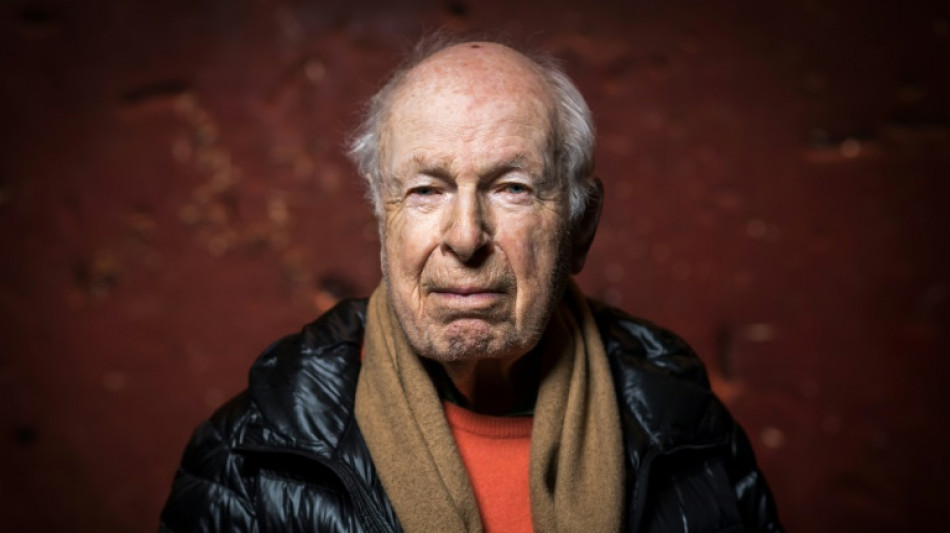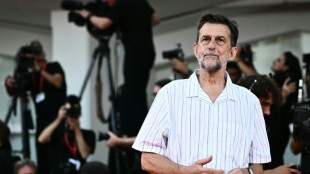
-
 Japan says US tariffs 'extremely regrettable', may break WTO rules
Japan says US tariffs 'extremely regrettable', may break WTO rules
-
South Koreans anxious, angry as court to rule on impeached president

-
 Juve at in-form Roma with Champions League in the balance
Juve at in-form Roma with Champions League in the balance
-
Injuries put undermanned Bayern's title bid to the test

-
 Ovechkin scores 892nd goal -- three away from Gretzky's NHL record
Ovechkin scores 892nd goal -- three away from Gretzky's NHL record
-
Australian former rugby star Petaia signs for NFL's Chargers

-
 China says opposes new US tariffs, vows 'countermeasures'
China says opposes new US tariffs, vows 'countermeasures'
-
Athletics world watching as 'Grand Slam Track' prepares for launch

-
 Heat humble Celtics for sixth straight win, Cavs top Knicks
Heat humble Celtics for sixth straight win, Cavs top Knicks
-
Quake-hit Myanmar's junta chief to head to Bangkok summit

-
 New Spielberg, Nolan films teased at CinemaCon
New Spielberg, Nolan films teased at CinemaCon
-
Shaken NATO allies to meet Trump's top diplomat

-
 Israel's Netanyahu arrives in Hungary, defying ICC warrant
Israel's Netanyahu arrives in Hungary, defying ICC warrant
-
Shiny and deadly, unexploded munitions a threat to Gaza children

-
 Stocks tank, havens rally as Trump tariffs fan trade war
Stocks tank, havens rally as Trump tariffs fan trade war
-
Altomare hangs on to tie defending champ Korda at LPGA Match Play

-
 Paraguay gold rush leaves tea producers bitter
Paraguay gold rush leaves tea producers bitter
-
Health concerns swirl as Bolivian city drowns in rubbish

-
 Syria says deadly Israeli strikes a 'blatant violation'
Syria says deadly Israeli strikes a 'blatant violation'
-
Financial markets tumble after Trump tariff announcement

-
 Starbucks faces new hot spill lawsuits weeks after $50mn ruling
Starbucks faces new hot spill lawsuits weeks after $50mn ruling
-
Europe riled, but plans cool-headed response to Trump's tariffs

-
 'Shenmue' voted most influential video game ever in UK poll
'Shenmue' voted most influential video game ever in UK poll
-
New coal capacity hit 20-year low in 2024: report

-
 Revealed: Why monkeys are better at yodelling than humans
Revealed: Why monkeys are better at yodelling than humans
-
Key details on Trump's market-shaking tariffs

-
 'A little tough love': Top quotes from Trump tariff talk
'A little tough love': Top quotes from Trump tariff talk
-
US business groups voice dismay at Trump's new tariffs

-
 Grealish dedicates Man City goal to late brother
Grealish dedicates Man City goal to late brother
-
US tariffs take aim everywhere, including uninhabited islands

-
 Trump sparks trade war with sweeping global tariffs
Trump sparks trade war with sweeping global tariffs
-
Israeli strikes hit Damascus, central Syria; monitor says 4 dead

-
 Slot 'hates' offside rule that gave Liverpool win over Everton
Slot 'hates' offside rule that gave Liverpool win over Everton
-
US stocks end up, but volatility ahead after latest Trump tariffs

-
 Barca oust Atletico to set up Clasico Copa del Rey final
Barca oust Atletico to set up Clasico Copa del Rey final
-
Mourinho grabs Galatasaray coach's face after losing Istanbul derby

-
 Grealish strikes early as Man City move up to fourth in Premier League
Grealish strikes early as Man City move up to fourth in Premier League
-
Reims edge out fourth-tier Cannes to set up PSG French Cup final

-
 Liverpool beat Everton as title looms, Man City win without Haaland
Liverpool beat Everton as title looms, Man City win without Haaland
-
Jota wins bad-tempered derby as Liverpool move 12 points clear

-
 Inter and Milan level in derby Italian Cup semi
Inter and Milan level in derby Italian Cup semi
-
Stuttgart beat Leipzig to reach German Cup final

-
 Trump unveils sweeping global tariffs
Trump unveils sweeping global tariffs
-
Italian director Nanni Moretti in hospital after heart attack: media

-
 LIV Golf stars playing at Doral with Masters on their minds
LIV Golf stars playing at Doral with Masters on their minds
-
Trump unveils sweeping 'Liberation Day' tariffs

-
 Most deadly 2024 hurricane names retired from use: UN agency
Most deadly 2024 hurricane names retired from use: UN agency
-
Boeing chief reports progress to Senate panel after 'serious missteps'

-
 Is Musk's political career descending to Earth?
Is Musk's political career descending to Earth?
-
On Mexico-US border, Trump's 'Liberation Day' brings fears for future


Peter Brook: mystical giant who changed theatre forever
Peter Brook, who has died aged 97, was among the most influential theatre directors of the 20th century, reinventing the art by paring it back to drama's most basic and powerful elements.
An almost mystical figure often mentioned in the same breath as Konstantin Stanislavsky, the Russian who revolutionised acting, Brook continued to work and challenge audiences well into his 90s.
Best-known for his 1985 masterpiece "The Mahabharata", a nine-hour version of the Hindu epic, he lived in Paris from the early 1970s, where he set up the International Centre for Theatre Research in an old music hall called the Bouffes du Nord.
A prodigy who made his professional directorial debut at just 17, Brook was a singular talent right from the start.
He mesmerised audiences in London and New York with his era-defining "Marat/Sade" in 1964, which won a Tony award, and wrote "The Empty Space", one of the most influential texts on theatre ever, three years later.
Its opening lines became a manifesto for a generation of young performers who would forge the fringe and alternative theatre scenes.
"I can take any empty space and call it a bare stage," he wrote.
"A man walks across an empty space whilst someone else is watching him, and this is all that is needed for an act of theatre..."
For many, Brook's startling 1970 Royal Shakespeare Company production of "A Midsummer Night's Dream" in a white-cube gymnasium was a turning point in world theatre.
It inspired actress Helen Mirren to abandon her burgeoning mainstream career to join his nascent experimental company in Paris.
- African odyssey -
Born in London on March 21, 1925, to a family of Jewish scientists who had immigrated from Latvia, Brook was an acclaimed director in London's West End by his mid-20s.
Before his 30th birthday he was directing hits on Broadway.
But driven by a passion for experimentation that he picked up from his parents, Brook soon "exhausted the possibilities of conventional theatre".
His first film, "Lord of the Flies" (1963), an adaptation of the William Golding novel about schoolboys marooned on an island who turn to savagery, was an instant classic.
By the time he took a production of "King Lear" to Paris a few years later, he was developing an interest in working with actors from different cultures.
In 1971 he moved permanently to the French capital, and set off the following year with a band of actors including Mirren and the Japanese legend Yoshi Oida on an 8,500-mile (13,600-kilometre) odyssey across Africa to test his ideas.
Drama critic John Heilpern, who documented their journey in a bestselling book, said Brook believed theatre was about freeing the audience's imagination.
"Every day they would lay out a carpet in a remote village and would improvise a show using shoes or a box," he later told the BBC.
"When someone entered the carpet the show began. There was no script or no shared language."
But the gruelling trip took its toll on his company, most of whom fell ill with dysentery or tropical diseases.
Mirren later described it as "the most frightening thing I have ever done. There was nothing to hold onto."
She parted company with Brook soon after.
He "thought that stardom was wicked and tasteless... I just wanted my name up there," she told AFP.
- 'Mahabharata' masterpiece -
Brook continued to experiment at the Bouffes du Nord, touring his productions across the globe.
His big landmark after "The Mahabharata" was "L'Homme Qui" in 1993, based on Oliver Sacks' bestseller about neurological dysfunction, "The Man Who Mistook his Wife for a Hat".
Brook returned to Britain in triumph in 1997 with Samuel Beckett's "Happy Days" and his actress wife Natasha Parry in the lead.
Critics hailed him as "the best director London does not have".
After turning 85 in 2010, Brook relinquished leadership of the Bouffes du Nord but continued to direct there.
Eight years later, aged 92, he wrote and staged "The Prisoner" with Marie-Helene Estienne -- one of the two women with whom he shared his life.
The real-life story was based on his own spiritual journey to Afghanistan just before the Soviet invasion to shoot a film called "Meetings with Remarkable Men" in 1978.
It was adapted from a book by mystical philosopher George Gurdjieff, whose sacred dances Brook performed daily for years.
Quiet-spoken, cerebral and charismatic, Brook was often seen as something of a Sufi himself.
But Parry's death in 2015 shook him. "One tries to bargain with fate and say, just bring her back for 30 seconds," he said.
Yet he never stopped working despite failing eyesight.
"I have a responsibility to be as positive and creative as I can," he told The Guardian. "To give way to despair is the ultimate cop-out," he said.
G.Stevens--AMWN
